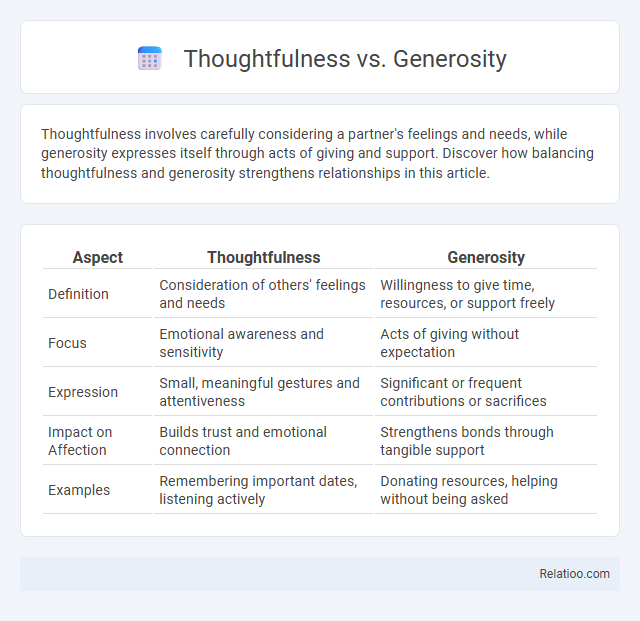Thoughtfulness involves carefully considering a partner's feelings and needs, while generosity expresses itself through acts of giving and support. Discover how balancing thoughtfulness and generosity strengthens relationships in this article.
Table of Comparison
| Aspect | Thoughtfulness | Generosity |
|---|---|---|
| Definition | Consideration of others' feelings and needs | Willingness to give time, resources, or support freely |
| Focus | Emotional awareness and sensitivity | Acts of giving without expectation |
| Expression | Small, meaningful gestures and attentiveness | Significant or frequent contributions or sacrifices |
| Impact on Affection | Builds trust and emotional connection | Strengthens bonds through tangible support |
| Examples | Remembering important dates, listening actively | Donating resources, helping without being asked |
Understanding Thoughtfulness: The Power of Intent
Understanding thoughtfulness centers on the power of intent, emphasizing deliberate consideration for others' feelings and needs. Unlike generosity, which focuses on giving, and kindness, which relates to warm-hearted behavior, thoughtfulness requires mindful actions driven by genuine concern. This intentional awareness fosters deeper connections and meaningful interactions beyond surface-level gestures.
Defining Generosity: Beyond Material Giving
Generosity extends beyond material giving to encompass acts of kindness, empathy, and selflessness that enrich relationships and foster trust. It involves offering time, attention, and emotional support, demonstrating a genuine concern for others' well-being. True generosity cultivates a positive social environment by prioritizing the needs of others without expecting anything in return.
Key Differences Between Thoughtfulness and Generosity
Thoughtfulness involves consideration and attentiveness to others' feelings and needs, often expressed through small, meaningful actions or gestures. Generosity refers to the willingness to give resources, such as time, money, or possessions, without expecting anything in return. Your ability to distinguish between thoughtfulness and generosity enhances interpersonal relationships by balancing emotional awareness with tangible support.
How Thoughtfulness Shapes Relationships
Thoughtfulness enhances relationships by demonstrating genuine care through attentive actions and empathy, fostering deep emotional connections. Unlike generosity, which often involves giving tangible resources, thoughtfulness emphasizes understanding and anticipating Your loved ones' needs, creating trust and lasting bonds. Consistent thoughtfulness cultivates an environment where meaningful communication and mutual respect thrive, strengthening relational intimacy over time.
Generosity as a Catalyst for Social Good
Generosity serves as a powerful catalyst for social good by inspiring collective action and fostering community resilience. Your willingness to share time, resources, or skills can create ripple effects that amplify positive change beyond individual acts of kindness. While thoughtfulness and empathy lay the foundation, it is generosity that actively mobilizes support and drives impactful solutions.
The Role of Empathy in Both Traits
Empathy serves as the foundation for both thoughtfulness and generosity, enabling you to understand and share the feelings of others. Thoughtfulness reflects this empathy through attentive consideration of others' needs and preferences, while generosity manifests in the willingness to give resources or support without expecting anything in return. Cultivating empathy strengthens your ability to act thoughtfully and generously, fostering deeper connections and meaningful relationships.
When Generosity Lacks Thoughtfulness
Generosity without thoughtfulness can lead to misplaced efforts or unintended consequences, as giving without considering the recipient's true needs may cause discomfort or waste resources. Thoughtfulness ensures that your generous actions align with the best interests and feelings of others, enhancing the impact and appreciation of your giving. Balancing generosity with thoughtful consideration transforms your contributions into meaningful and positive experiences for those you intend to help.
Thoughtful Actions vs. Generous Gestures
Thoughtful actions involve carefully considering others' needs and feelings, often through personalized attention and meaningful support that reflects deep empathy. Generous gestures emphasize the giving of resources, time, or help freely without expecting anything in return, highlighting abundance and selflessness. While thoughtfulness prioritizes emotional insight and intention behind acts, generosity focuses more on the tangible extent of giving, both complementing but distinct in social interactions.
Cultivating Balance: Being Both Thoughtful and Generous
Cultivating balance between thoughtfulness and generosity enhances your relationships by combining meaningful consideration with selfless giving. Thoughtfulness involves anticipating others' needs and emotions, while generosity focuses on willingly sharing resources or time without expecting anything in return. Striking this balance ensures your actions are both intentional and impactful, fostering deeper connections and mutual respect.
Real-Life Examples: Navigating Thoughtfulness and Generosity
Thoughtfulness involves anticipating others' needs with sensitivity, such as remembering a friend's birthday or offering support during tough times, while generosity emphasizes giving resources like time, money, or assistance without expecting anything in return, exemplified by volunteering at a local shelter. Real-life navigation between thoughtfulness and generosity requires balance; a thoughtful gift may carry more emotional weight than a lavish one, and generous acts may fall short if they lack personal consideration. Effective interpersonal relationships often blend both qualities, fostering empathy through mindful gestures and impactful giving.

Infographic: Thoughtfulness vs Generosity
 relatioo.com
relatioo.com